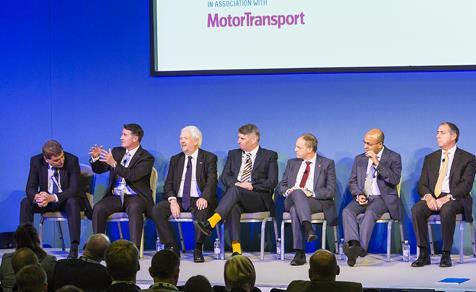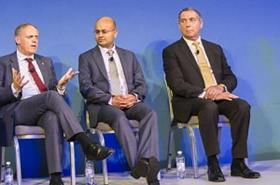
Watch what happened at the Microlise Transport Conference last month, when Motortransport.co.uk chaired a debate between seven of the eight major truck manufacturers, who were looking ahead to what the market holds for all in road transport in 2020.
Over a wide-ranging session hot topics such as autonomous trucks; alternative fuels and the EU referendum were keenly debated.
https://www.youtube.com/watch?v=qbp8N08FFhQ
First up: what fuel will power the engine of the future? John Cromer, Volvo UK truck product manager, took up the challenge: “In the short-term it is the diesel engine because it is the best energy converter,” he explained.
When it comes to alternative fuels he said the industry was moving away from biodiesel to hydrotreated vegetable oils (HVO) which “can swap in for diesel today”. Longer term, Cromer said that Volvo was still working with gas, both CNG trucks biomethane.
“It is all about storing that energy on the truck,” he said.
Arif Jafferji, business development and marketing manager at Scania, said its approach is to support its customers by providing solutions for whichever fuel they choose to use. Consequently, the company offers a full range of options including biodiesel, dedicated natural gas/biogas, HVO, hybrid and bioethanol.
Government, customers and manufacturers will all have to get together and look at what the future holds.
Simon Elliott, chief executive at MAN, added: “I have only been in the truck industry for 20 months and before that I was in passenger cars. The important thing is we cannot close our minds to what is going to happen. Five years ago I said that electric cars would never take off, and look at what is happening now with the likes of Nissan and Tesla.
“The problem is we are looking at a myriad of different fuels scattered about. The research and development arms of every manufacturer should get together to find one that is the most logical, most efficient and most easy to use. Otherwise you will have on brand going one way and one another and all claiming they have found eureka. It's an industry issue not a brand issue,” he said.
Ray Ashworth, MD of Daf Trucks, said that truck manufacturers had all produced hybrid trucks in the past and “registration numbers for the UK approached 50” when you added together the performance of every manufacturer. “That's because we all went down our own road and costs were high,” he said.

Martin Flach, product director UK and Ireland at Iveco, said: “None of us on this platform know what will be the right technology going forward and what will work in an urban distribution environment will not be the same as on trunking.
“I would say in today's picture I would use electric in the urban environment, while running up and down it would be natural gas - either compressed or in its natural form.
"But that does not mean to say that we will not be talking about something else. Hydrogen has been a thirty years away technology for the past thirty years - and it is still thirty years away,” he said.
Given the governmental focus on clean air, at both a national and local level, the discussion regarding alternative fuels moved on to the challenges facing the truck in towns and cities. Jafferji said that given the growing urbanisation of the UK population the entire intrust had “to be smarter”.
“We have talked about different fuels and technologies but our vehicles are also more connected. Can we become more efficient with their use - and optimise that journey?” he said.
There are distinct segments in the market. It is accepted to have a trendy looking van on your drive. We have got to show our customers that we understand the van market in this segment.
Ashworth added: “Segregate out deliveries from traffic in the morning moves you to nigh time deliveries. If you can convince residents that we can deliver quietly, that gets you out of the peak times.”
MAN’s Elliott raised the changing nature of urban deliveries, from retail outlets to direct deliveries to the home: “You don't go to the goods any more, you sit and wait. That means that goods are put into smaller vehicles whether they be vans or smaller trucks. People will look at downsizing. It is the way we are buying things that will drive it.
“But it is also about what government want. They click their fingers and say that trucks that go into London will have these different mirrors on, like Quadrophenia with 100 mirrors. But that is what we will have to do and we will have to engage with government. And what will our customers want? We will have to satisfy their requirements as well.
"The world is slowly changing and our customers are having to change their business models as well. Government, customers and manufacturers will all have to get together and look at what the future holds.”
Hydrogen has been a thirty years away technology for the past thirty years - and it is still thirty years away
Iveco’s Flach pointed out that online shopping is all being delivered by a 3.5t vehicle and questioned why that was. He said that some 20 years ago driving licence regulations were changed so younger drivers can now only drive vehicles to a 3.5t weight limit.
“That has driven the polarisation of the market down to the 3.5t vehicle and away from the 7.5t vehicle. One way we can do something about that is change that part of the legislation and allow people to drive a bigger vehicle - with a tighter test,” he said.

This led the panel on to consider the future of the light rigid. Daf’s Ashworth said: “We will still have a 7.5t market. The below 16t market has not really recovered since 2008 but the heavier end above 16t has recovered.”
Elliott took the opportunity to discuss MAN’s forthcoming van range: “[We are] launching a van from 3t to 5.5t next year. You have to look at the van market in very distinct segments. The Crafter size, Sprinter size, Iveco Daily size vehicles are not well sold by car dealers, small and medium sized vans are sold because it is alloy wheels and dark glass.
"There are distinct segments in the market. It is accepted to have a trendy looking van on your drive. We have got to show our customers that we understand the van market in this segment. We have looked at the data for the MAN TGE, which comes next year, and a big proportion is rental, a big proportion is contract hire.
“We see our customer base as our main opportunity. Simply because they know how well we can look after them. We have invested £1m in customer care this year. And if we can bring that to the van market they will say I am not buying something I am emotionally attached to, this is something that will serve my business well, and I can get it served seven days a week at my heavy duty dealer.”














